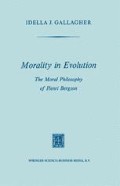Abstract
The dominant currents of philosophical thought in France during the latter half of the nineteenth century were those of positivism and mechanism. The impact of Comte’s Cours de philosophie positive (1839–42) and Kant’s Kritik der reinen Vernunft (1781), together with the phenomenal success of the exact sciences, had created a deep-seated prejudice against metaphysics and made way for an unmitigated scientism. Ernest Renan, whose authority was almost unquestioned by the men of Bergson’s generation, exemplified this mentality with his “religion of science.” John Stuart Mill, applying the associationist theory in psychology, had prepared the way for the determinism which found its most influential French spokesman in Hippolyte Taine. Evolutionism too was in the air, and Bergson, like Samuel Alexander and John Dewey who were also born in the fateful year of 1859, grew up under its spell.
Access this chapter
Tax calculation will be finalised at checkout
Purchases are for personal use only
Preview
Unable to display preview. Download preview PDF.
References
Lettre à W. James, 9 Mai 1908, Henri Bergson, Écrits et Paroles, ed. R. M. MosséBastide (Paris: Presses Universitaires de France, 1959). II, pp. 294–95. The three volumes of this work contain 167 items including articles, reviews, notes, letters, and summaries of Bergson’s courses at the Collège de France.
For an informative discussion of the currents of thought in nineteenth century France which influenced Bergson see Jacques Chevalier, Henri Bergson (Paris: Librairie Pion, 1926 ), Ch. I.
George Santayana, Winds of Doctrine, and Platonism and the Spiritual Life (New York: Harper and Brothers, Harper Torchbooks, 1957 ), p. 107.
Letter to Henri Bergson, December 14, 1902, The Letters of William James, edited by his son Henry James in two volumes (Boston: The Atlantic Monthly Press, 1920), II, p. 179.
To F. C. S. Schiller, June 13, 1907. “ and ”To Henri Bergson, June, 1907, The Letters of William James, II, pp. 290–9I.
L’homme et le philosophe, Henri Bergson, essais et témoignages recueillis, edited by Albert Béguin and Pierre Thévenaz (Neuchâtel: Editions de la Baconnière, 1943), p. 41.
The Scientific Approach to Philosophy (London: Macmillan and Company. 1924)• pp. 75, 93.
Une philosophie nouvelle, Henri Bergson ( Paris: Alcan, 1912 ), pp. I - 2.
We Have Been Friends Together, translated by Julie Kernan (New York: Longmans, Green and Company. 1942 ), pp. 84–85.
The Philosopher and Theology (New York: Random House, 1962), p. 119. Cf. Etienne Gilson, “Compagnons de route,” in Etienne Gilson, Philosophe de la Chrétienté, by Jacques Maritain and others ( Paris: Les Editions du Cerf, 1949 ), pp. 275–95.
Isaac Benrubi, Contemporary Thought of France ( London: Williams and Norgate Limited. 1926 ), p. 169.
la méthode philosophique, telle que je l’entends, est rigoureusement calquée sur l’expérience (intérieure et extérieure), et ne permet pas d’énoncer une conclusion qui dépasse de quoi que ce soit les considérations empiriques sur lesquelles elle se fonde…. la philosophie étant à mes yeux quelque chose qui se constitue selon une méthode bien déterminée et qui peut, grâce à cette méthode, prétendre à une objectivité aussi grande que celle des sciences positives, quoique d’une autre nature. Lettre au P. Joseph de Tonquédec, 20 février, 1912, Henri Bergson, Écrits et Paroles, II, pp. 365–66.
Jacques Chevalier, Entretiens avec Bergson ( Paris: Librairie Plon, 1959 ), p. 20.
Delivered in English, this lecture was published in The Hibbert Journal (October 1911). A revised version appeared in French in 1919 as the first essay in L’Énergie spirituelle, Essais et conférences (Paris: Félix Alcan), and it is this revision which is to be found in English translation in Mind-Energy ( New York: Henry Holt, 1920 ), pp. 3–36.
Mind-Energy pp. 31–32 (O. 833–34). Bergson enjoyed the happy advantage, rare among authors, of directing the English translations of his own works, and it is these official translations that we are employing here. After numerous editions and reprintings of his books, there appeared in 1959 the critical French edition of his principal works, Henri Bergson, Oeuvres, with an introduction by Henri Gouhier and annotations by André Robinet (Paris: Presses Universitaires de France). This volume contains the text of seven books (see Bibliography for the list of titles), a critical apparatus, historical notes and two indices. In the introduction to this volume Gouhier observes that the writings of Bergson may be classed in three groups: (I) the seven books printed in the Oeuvres, (2) the 167 items of philosophic interest published in Écrits et Paroles (see Note 1 above), (3) unpublished literary remains whose publication was formally forbidden by Bergson in his last will and testament. We should mention also for the sake of completeness Bergson’s thesis on Aristotle and his Durée et Simultanéité (both listed in the Bibliography) which are not included in the Oeuvres. The latter work was not reprinted after 1926 because Bergson felt that he lacked the mathematical knowledge necessary for a thorough discussion of relativity theory and so, in the words of Édouard Le Roy, “il estimait plus sage, pour sa part, de laisser tomber la question”. Lettre-Préface to Écrits et Paroles, I, pp. vii—viii. In our references, along with page numbers to the English versions of Bergson’s works, we shall cite in parenthesis those to the Oeuvres for readers who wish to consult the French text.
Jacques Chevalier, Entretiens avec Bergson. P. 145.
Author information
Authors and Affiliations
Rights and permissions
Copyright information
© 1970 Springer Science+Business Media Dordrecht
About this chapter
Cite this chapter
Gallagher, I.J. (1970). Introduction. In: Morality in Evolution. Springer, Dordrecht. https://doi.org/10.1007/978-94-015-7573-7_1
Download citation
DOI: https://doi.org/10.1007/978-94-015-7573-7_1
Publisher Name: Springer, Dordrecht
Print ISBN: 978-94-017-0034-4
Online ISBN: 978-94-015-7573-7
eBook Packages: Springer Book Archive

